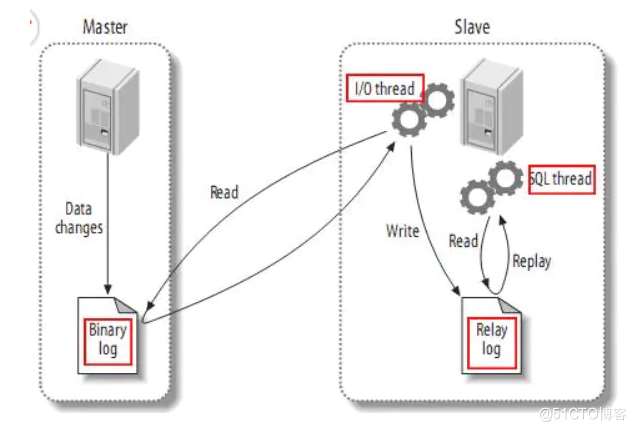您现在的位置是:网站首页> 编程资料编程资料
mysql5.6主从搭建以及不同步问题详解_Mysql_
![]() 2023-05-26
373人已围观
2023-05-26
373人已围观
简介 mysql5.6主从搭建以及不同步问题详解_Mysql_
系统:centos6.6
主:192.168.142.129 mysql-5.6.30.tar.gz
从:192.168.142.130 192.168.142.131 mysql-5.6.30.tar.gz
一、mysql主从复制原理

(1) master将改变记录到二进制日志(binary log)中;
(2) slave将master的binary log events拷贝到它的中继日志(relay log);slave的I/O线程从master的二进制日志中读取事件并写入中继日志;
(3) slave重做中继日志中的事件,将改变反映它自己的数据。slave的SQL线程从中继日志读取事件,并在本地重放其中的事件,使其与master中的数据一致。
mysql主从实现的步骤:
1、使用mysqldump 命令备份数据库,
2、查看主节点二进制的位置点
3、创建备份用户,并授权(replication client.replication slave)
4、从服务器修改server-id,必须与主mysql的server-id不同,开启中继日子,关闭二进制日子
5、从数据库,倒入数据,并使用授权用户,连接主mysql
6、start slave
SQL语言共分为以下几大类:查询语言DQL,控制语言DCL,操纵语言DML,定义语言DDL。事务控制TCL.
DQL(Data QUERY Languages)语句:即数据库定义语句,用来查询SELECT子句,FROM子句,WHERE子句组成的查询块,比如:select–from–where–grouop by–having–order by–limit
DDL(Data Definition Languages)语句:即数据库定义语句,用来创建数据库中的表、索引、视图、存储过程、触发器等,常用的语句关键字有CREATE,ALTER,DROP,TRUNCATE,COMMENT,RENAME。增删改表的结构
DML(Data Manipulation Language)语句:即数据操纵语句,用来查询、添加、更新、删除等,常用的语句关键字有:SELECT,INSERT,UPDATE,DELETE,MERGE,CALL,EXPLAIN PLAN,LOCK TABLE,包括通用性的增删改查。增删改表的数据
DCL(Data Control Language)语句:即数据控制语句,用于授权/撤销数据库及其字段的权限(DCL is short name of Data Control Language which includes commands such as GRANT and mostly concerned with rights, permissions and other controls of the database system.)。常用的语句关键字有:GRANT,REVOKE。
TCL(Transaction Control Language)语句:事务控制语句,用于控制事务,常用的语句关键字有:COMMIT,ROLLBACK,SAVEPOINT,SET TRANSACTION。
二、mysql编译安装
#!/bin/bash yum -y install make gcc gcc-c++ openssl openssl-devel pcre-devel gd cmake ncurses ncurses-devel id -u mysql if [ `echo $?` -ne 0 ]; then groupadd mysql useradd -M -g mysql -s /sbin/nologin mysql fi if [ ! -d "/usr/local/mysql" ]; then mkdir -p /usr/local/mysql fi mkdir -p /data/mysql chown -R mysql:mysql /data/mysql cd /home/soft/ #软件存放目录 tar zxvf mysql-5.6.30.tar.gz cd mysql-5.6.30 cmake -DCMAKE_INSTALL_PREFIX=/usr/local/mysql -DSYSCONFDIR=/etc -DMYSQL_DATADIR=/data/mysql/data -DINSTALL_MANDIR=/usr/share/man -DMYSQL_TCP_PORT=3306 -DMYSQL_UNIX_ADDR=/tmp/mysql.sock -DDEFAULT_CHARSET=utf8 -DEXTRA_CHARSETS=all -DDEFAULT_COLLATION=utf8_general_ci -DWITH_READLINE=1 -DWITH_SSL=system -DWITH_EMBEDDED_SERVER=1 -DENABLED_LOCAL_INFILE=1 -DWITH_INNOBASE_STORAGE_ENGINE=1 make && make install chown -R mysql:mysql . chmod +x scripts/mysql_install_db ./scripts/mysql_install_db --user=mysql --basedir=/usr/local/mysql --datadir=/data/mysql cp ./support-files/mysql.server /etc/rc.d/init.d/mysqld chmod 755 /etc/init.d/mysqld chkconfig mysqld on cat> /etc/rc.d/init.d/mysqld <<'EOF' #mysql启动脚本 #!/bin/sh # Copyright Abandoned 1996 TCX DataKonsult AB & Monty Program KB & Detron HB # This file is public domain and comes with NO WARRANTY of any kind # MySQL daemon start/stop script. # Usually this is put in /etc/init.d (at least on machines SYSV R4 based # systems) and linked to /etc/rc3.d/S99mysql and /etc/rc0.d/K01mysql. # When this is done the mysql server will be started when the machine is # started and shut down when the systems goes down. # Comments to support chkconfig on RedHat Linux # chkconfig: 2345 64 36 # description: A very fast and reliable SQL database engine. # Comments to support LSB init script conventions ### BEGIN INIT INFO # Provides: mysql # Required-Start: $local_fs $network $remote_fs # Should-Start: ypbind nscd ldap ntpd xntpd # Required-Stop: $local_fs $network $remote_fs # Default-Start: 2 3 4 5 # Default-Stop: 0 1 6 # Short-Description: start and stop MySQL # Description: MySQL is a very fast and reliable SQL database engine. ### END INIT INFO # If you install MySQL on some other places than /usr/local/mysql, then you # have to do one of the following things for this script to work: # # - Run this script from within the MySQL installation directory # - Create a /etc/my.cnf file with the following information: # [mysqld] # basedir=# - Add the above to any other configuration file (for example ~/.my.ini) # and copy my_print_defaults to /usr/bin # - Add the path to the mysql-installation-directory to the basedir variable # below. # # If you want to affect other MySQL variables, you should make your changes # in the /etc/my.cnf, ~/.my.cnf or other MySQL configuration files. # If you change base dir, you must also change datadir. These may get # overwritten by settings in the MySQL configuration files. basedir=/usr/local/mysql datadir=/data/mysql # Default value, in seconds, afterwhich the script should timeout waiting # for server start. # Value here is overriden by value in my.cnf. # 0 means don't wait at all # Negative numbers mean to wait indefinitely service_startup_timeout=900 # Lock directory for RedHat / SuSE. lockdir='/var/lock/subsys' lock_file_path="$lockdir/mysql" # The following variables are only set for letting mysql.server find things. # Set some defaults mysqld_pid_file_path= if test -z "$basedir" then basedir=/usr/local/mysql bindir=/usr/local/mysql/bin if test -z "$datadir" then datadir=/data/mysql/data fi sbindir=/usr/local/mysql/bin libexecdir=/usr/local/mysql/bin else bindir="$basedir/bin" if test -z "$datadir" then datadir="$basedir/data" fi sbindir="$basedir/sbin" libexecdir="$basedir/libexec" fi # datadir_set is used to determine if datadir was set (and so should be # *not* set inside of the --basedir= handler.) datadir_set= # Use LSB init script functions for printing messages, if possible # lsb_functions="/lib/lsb/init-functions" if test -f $lsb_functions ; then . $lsb_functions else log_success_msg() { echo " SUCCESS! $@" } log_failure_msg() { echo " ERROR! $@" } fi PATH="/sbin:/usr/sbin:/bin:/usr/bin:$basedir/bin" export PATH mode=$1 # start or stop [ $# -ge 1 ] && shift other_args="$*" # uncommon, but needed when called from an RPM upgrade action # Expected: "--skip-networking --skip-grant-tables" # They are not checked here, intentionally, as it is the resposibility # of the "spec" file author to give correct arguments only. case `echo "testing\c"`,`echo -n testing` in *c*,-n*) echo_n= echo_c= ;; *c*,*) echo_n=-n echo_c= ;; *) echo_n= echo_c='\c' ;; esac parse_server_arguments() { for arg do case "$arg" in --basedir=*) basedir=`echo "$arg" | sed -e 's/^[^=]*=//'` bindir="$basedir/bin" if test -z "$datadir_set"; then datadir="$basedir/data" fi sbindir="$basedir/sbin" libexecdir="$basedir/libexec" ;; --datadir=*) datadir=`echo "$arg" | sed -e 's/^[^=]*=//'` datadir_set=1 ;; --pid-file=*) mysqld_pid_file_path=`echo "$arg" | sed -e 's/^[^=]*=//'` ;; --service-startup-timeout=*) service_startup_timeout=`echo "$arg" | sed -e 's/^[^=]*=//'` ;; esac done } wait_for_pid () { verb="$1" # created | removed pid="$2" # process ID of the program operating on the pid-file pid_file_path="$3" # path to the PID file. i=0 avoid_race_condition="by checking again" while test $i -ne $service_startup_timeout ; do case "$verb" in 'created') # wait for a PID-file to pop into existence. test -s "$pid_file_path" && i='' && break ;; 'removed') # wait for this PID-file to disappear test ! -s "$pid_file_path" && i='' && break ;; *) echo "wait_for_pid () usage: wait_for_pid created|removed pid pid_file_path" exit 1 ;; esac # if server isn't running, then pid-file will never be updated if test -n "$pid"; then if kill -0 "$pid" 2>/dev/null; then : # the server still runs else # The server may have exited between the last pid-file check and now. if test -n "$avoid_race_condition"; then avoid_race_condition="" continue # Check again. fi # there's nothing that will affect the file. log_failure_msg "The server quit without updating PID file ($pid_file_path)." return 1 # not waiting any more. fi fi echo $echo_n ".$echo_c" i=`expr $i + 1` sleep 1 done if test -z "$i" ; then log_success_msg return 0 else log_failure_msg return 1 fi } # Get arguments from the my.cnf file, # the only group, which is read from now on is [mysqld] if test -x ./bin/my_print_defaults then print_defaults="./bin/my_print_defaults" elif test -x $bindir/my_print_defaults then print_defaults="$bindir/my_print_defaults" elif test -x $bindir/mysql_print_defaults then print_defaults="$bindir/mysql_print_defaults" else # Try to find basedir in /etc/my.cnf conf=/etc/my.cnf print_defaults= if test -r $conf then subpat='^[^=]*basedir[^=]*=\(.*\)$' dirs=`sed -e "/$subpat/!d" -e 's//\1/' $conf` for d in $dirs do d=`echo $d | sed -e 's/[ ]//g'` if test -x "$d/bin/my_print_defaults" then print_defaults="$d/bin/my_print_defaults" break fi if test -x "$d/bin/mysql_print_defaults" then print_defaults="$d/bin/mysql_print_defaults" break fi done fi # Hope it's in the PATH ... but I doubt it test -z "$print_defaults" && print_defaults="my_print_defaults" fi # # Read defaults file from 'basedir'. If there is no defaults file there # check if it's in the old (depricated) place (datadir) and read it from there # extra_args="" if test -r "$basedir/my.cnf" then extra_args="-
相关内容
- MySQL图形化管理工具Navicat安装步骤_Mysql_
- MySql模糊查询json关键字检索方案示例_Mysql_
- MySQL触发器的使用和优缺点介绍_Mysql_
- Linux系统下修改mysql字符集为UTF8步骤_Mysql_
- Windows下MySQL详细安装过程及基本使用_Mysql_
- Mysql更新自增主键id遇到的问题_Mysql_
- Ubuntu搭建Mysql+Keepalived高可用的实现(双主热备)_Mysql_
- 教你一招永久解决mysql插入中文失败问题_Mysql_
- MySQL多版本并发控制MVCC深入学习_Mysql_
- MySQL在线开启或禁用GTID模式_Mysql_
点击排行
本栏推荐





